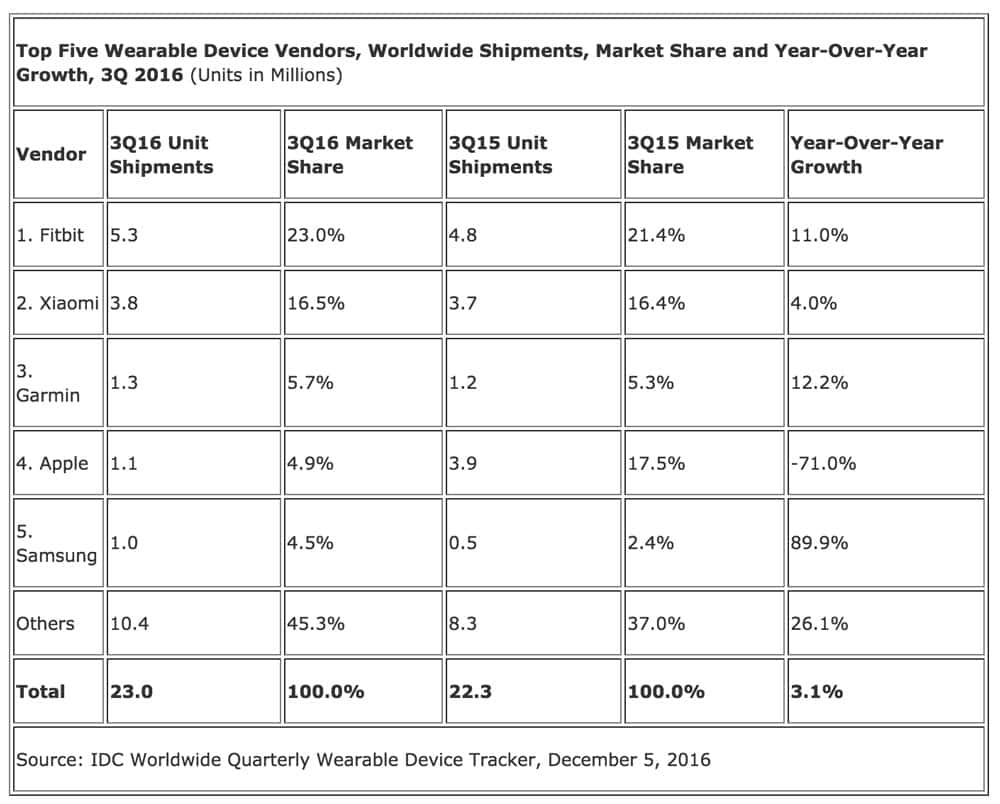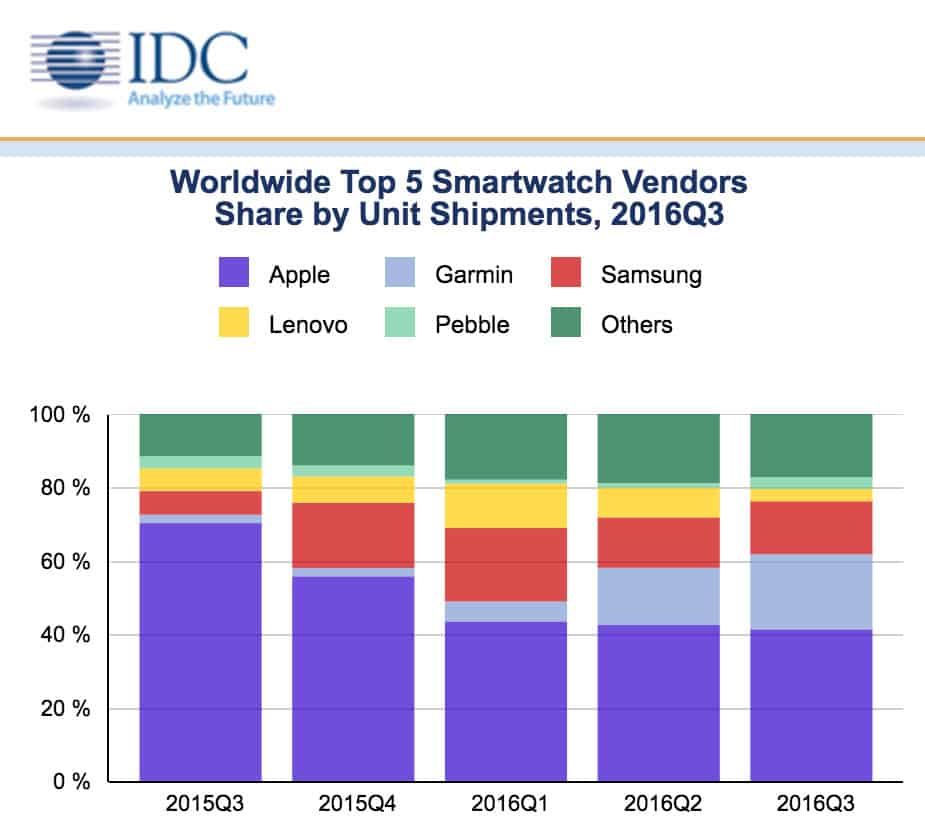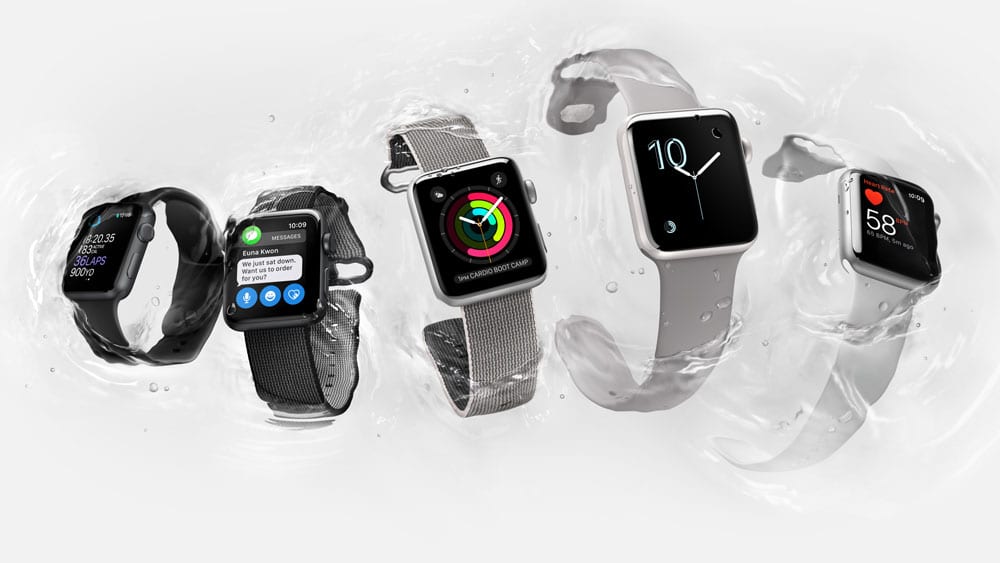Apple Watch shipments fell sharply in the third quarter, primarily due to the timing of the company’s “Series 2” revision, according to new data published today by IDC. Apple is estimated to have sold 1.1 million Apple Watch units in the third quarter of 2016, a 71 percent decline from the 3.9 million units the company sold in the same quarter last year.

IDC attributes the decline in Apple Watch sales to an “aging lineup and unintuitive user interface.” The first generation Apple Watch was released in April 2015, with Apple waiting until September 2016 to unveil the Apple Watch Series 2. With the product’s release so late in the third quarter, the Series 2, which addressed many of the user interface concerns, didn’t have time to significantly contribute to Apple’s sales numbers.
The decline in Apple Watch sales came amidst modest growth for the wearables market overall. The entire market, which includes both smartwatches and fitness trackers from companies such as Fitbit, grew 3.1 percent year-over-year. Fitbit maintained its lead in the market, selling 5.3 million units for 23.0 percent market share, an 11 percent increase over last year. Xiaomi, Garmin, and Samsung also saw year-over-year growth in shipments.
With 1.1 million units sold during the quarter, Apple is in fourth place among wearable vendors. However, the company retains the number one spot when considering just smartwatches, beating out competitors Garmin, Samsung, Lenovo, and Pebble. Apple also sells products at higher prices than its competitors (Apple Watch starts at $269 while Fitbit products start at around $60).

Despite this, IDC analyst Jitesh Ubrani expects the lower cost fitness-oriented wearables to continue to outpace the more complex smartwatch category:
It’s still early days, but we’re already seeing a notable shift in the market. Where smartwatches were once expected to take the lead, basic wearables now reign supreme. Simplicity is a driving factor and this is well reflected in the top vendor list as four out of five offer a simple, dedicated fitness device. Meanwhile, from a design perspective, many devices are focusing on fashion first while allowing the technology to blend in with the background.
However, IDC manager Ramon Llamas suggests that smartwatches may make a comeback in terms of marketshare, as consumers grow more accustomed to wearables and begin to demand greater functionality.

Actually Jim, other analysts disagree vehemently with IDC and instead report that Apple Watch sales grew 60% YoY and again dominated the smartwatch market with 45.6% market share. The number 2, Samsung only managed 18%.
Canalys reports the following:
“Apple shipped 2.8 million Watches in Q3, thanks to the release of the new Series 1 and Series 2 models late in the quarter. Despite reports to the contrary, Canalys research shows that shipments compared favorably to those in Q3 2015, the first full quarter after the original Apple Watch’s launch in April 2015. Total smart watch shipments exceeded 6.1 million for the quarter, an annual increase of 60%.”
My wife and love our Apple Watches and not just for the fitness aspect, but also texting, timers, Homekit, weather, and more.
Ha ha ha… a smart watch can’t do what a fitness tracker does? Not very smart, ey? Well, another prediction I nailed – the Watch is NOT the game changer it was cracked up to be, ey??? Nope, the market said we need no iPhone on our wrist tethered to another iPhone neither doing what a simple fitness tracker can do with any accuracy, go figure!!!
My wife got a series 2 for her birthday. In just a little I will get my series 2 for my birthday. Runkeeper just upgraded their watch app to take advantage of the GPS in the series 2. That is what we were waiting for in the Apple Watch. The phone stays home on our long runs.
I regret buying my Apple Watch. It’s just too small to do anything useful and I hardly ever wear it.
Most people I know have or are buying Apple Watch’s especially as Series 2 become available. The speed and the waterproofing (ability to swim) seems to have pushed it over the top, and the more friends get them we join each others “fitness circle” to motivate getting in shape.
I think the future for Apple Watch and smart watches in general is huge. Basing doom and gloom prediction on one quarters sales figures of an underpowered generation 1 watch is ridiculous. The smart watch trend has only just begun.
Couldn’t it also be that watches are a niche market, particularly watches that replicate the functionality of a device that we already carry with us? It has been my feeling that wearables in general are a dead end in terms of mass adoption, it’s just too much hassle to have to strap things on.
I don’t think you can lump all wearables together. Fitness trackers are distinct from SmartWatches. Fitness trackers are showing growth. Smart Watches are showing massive drops for Apple and all other brands. http://www.bbc.com/news/technology-37762239
This is why Apple is trying to position the AppleWatch as a fitness tracker. It’s the only part of the market that is doing well.